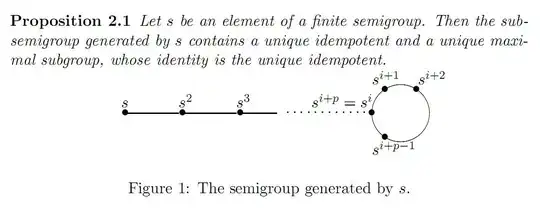That last comment of mine is long enough to turn into a full-fledged hint:
Let $t = s^{i+k}$; $t$ is idempotent iff $t=t^2$, i.e., iff $s^{i+k} = (s^{i+k})^2 = s^{2i+2k}$, so the real problem is showing that this is equivalent to the statement that $i+k \equiv 2i+2k \pmod p$, i.e., that $p$ divides $(2i+2k)-(i+k)=i+k$. One way to calculate $s^{2i+2k}$ is to start with $s^{i+k}$ and multiply by $s$ $i+k$ times. Each multiplication by $s$ advances the result one step around the cycle, so going from $s^{i+k}$ to $s^{2i+2k}$ takes $i+k$ steps. Clearly $s^{2i+2k}=s^{i+k}$ iff you end up back where you started, so $i+k$ steps take your from $s^{i+k}$ back to $s^{i+k}$. In other words, you must have gone round the cycle a whole number of times. What does that tell you about $i+k$?
